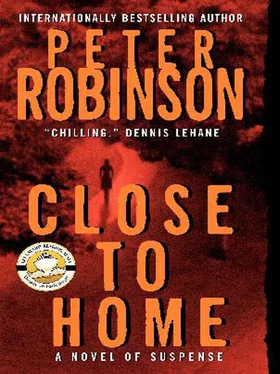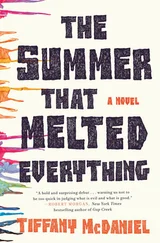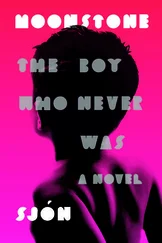“No. Starbucks will do fine. Half-five it is. That’ll give me plenty of time to pack and say my good-byes. See you there.”
Annie and Gristhorpe arrived at Hallam Tarn in time to see two police frogmen haul up the body and pull it back to shore with them. Peter Darby, crime scene photographer, sat in a dinghy nearby and videotaped everything. He had already taken several stills and Polaroids of the spot where the body had been first seen by Andrew Naylor. One of the lads at Helmthorpe had found a dry set of clothes for Naylor, and he stood with the small group, chewing his fingernails as the frogmen edged closer to shore.
Once on shore, they laid the body on the grass at the feet of Dr. Burns, the police surgeon. Dr. Glendenning, the Home Office pathologist, was unavailable that day, as he had been called in to help a colleague with a difficult case in Scarborough. Detective Sergeant Stefan Nowak, crime scene coordinator, and his scene-of-crime officers were on their way.
Well, Annie thought with some relief, at least it wasn’t a floater. She had been at the scene of more than one bloated, misshapen lump pulled from the water, and she didn’t relish another. But when she saw the face, she would gladly have accepted an anonymous floater any day. The body was Luke Armitage’s. No doubt about it. He was wearing the black T-shirt and jeans that Robin said he had on when he went to Eastvale, and he hadn’t been in the water long enough for his features to become unrecognizable, though the skin was white and there were signs of cutis anserina, more commonly known as gooseflesh. The once dark curls were straight now and stuck to his head and face like seaweed.
Annie stood aside and let Dr. Burns perform his in situ examination. “This is going to be difficult,” he told Annie. “In general, bodies decompose twice as fast in air as in water, but there are so many variables to take into account.”
“Any chance he drowned?”
The doctor examined Luke’s mouth for signs of foam and his eyes for the telltale petechial hemorrhages associated with asphyxia, of which drowning is a form. He shook his head and turned back to Annie. “Hard to be certain. We’ll have a better idea when Dr. Glendenning checks the lungs and runs a diatomic analysis.”
Diatoms, Annie knew from her basic courses in forensic science, were microorganisms that lived in the water. If you drowned, you breathed in a lot of them with the water and they spread to every nook and cranny of your body, even your bone marrow; if you hadn’t drowned but were found dead in water, then a few diatoms might be found, but they would be nowhere near as abundant or widely spread.
Dr. Burns turned the body over and pointed to the back of Luke’s head. Annie could see the signs of a blow. “Would that have been enough to cause death?” she asked.
“Hard blow to the cerebellum?” said Dr. Burns. “Certainly.” He began to examine the body in more detail. “He’s cold,” he said, “and there’s no rigor.”
“What does that tell you?”
“Usually a body is cold after eight to ten hours in the water. I’ll have to take his temperature to substantiate this, of course, and we’ll need to know the temperature of the water, too. As for the rigor, given the obvious effects of water on his skin, it must have come and gone.”
“How long does that take?”
“In water? Anything from two to four days.”
“Not sooner?”
“Not usually, no. Again, though, I’ll have to make some temperature checks. It might be summer but we’ve hardly been enjoying seasonal temperatures of late.”
Two days, Annie thought. It was Thursday afternoon now, and the ransom demand had come two days ago, on Tuesday evening. Was Luke already dead by then? If so, his death had nothing to do with her rash actions. She began to feel a glimmer of hope. If that was the case, then the kidnapper was trying to cash in on Luke’s death, which could have come about for other reasons. Curious. She would have to begin casting about for a motive now.
The sound of an approaching van interrupted Annie’s stream of thought, and she looked across to the wall to see DS Nowak and his SOCO team jumping the stile one after another, looking like sheep in their white protective clothing. Well, she thought, maybe the experts would be able to tell her a bit more.
Banks arrived half an hour early for his meeting with Michelle, parked in the short stay round the back of the town hall and cut through the arcade to Bridge Street, where he nipped into Waterstone’s and bought a book called The Profession of Violence, the story of the Kray twins. As he walked up the busy street toward the square, he marveled at how much the city center had changed since his day. For a start, it was all pedestrian precinct now, not busy roads the way it had been when he lived there. And it seemed cleaner, the buildings less shabby and grime-coated. It was a sunny afternoon, and tourists wandered in and out of the cathedral grounds into the square to spend a while browsing through the shops. Banks found it all quite pleasant, which didn’t square with his memory of being stuck in a dirty, small-minded provincial backwater. Maybe it was he who had changed the most.
He found Starbucks on the corner by the cathedral entrance and sipped a grande latte while he flipped through the book.
Michelle arrived five minutes late, cool and collected, wearing black slacks and a slate-gray jacket over a cream blouse. She went to the counter for a cappuccino, then sat down opposite Banks.
“Bit of a shock for you, wasn’t it, this morning?” she said.
“I suppose so,” Banks said. “After all these years… I don’t know, I suppose I’d allowed myself to believe there had to be a connection. Conned myself.”
“We all do, one way or another.”
“You’re too young to be so cynical.”
“And you should be old and wise enough to realize that flattery will get you nowhere. You’ve got a bit of froth on your lip.”
Before Banks could wipe it away, Michelle reached out her finger and did it for him, her fingertip brushing his lip.
“Thanks,” he said.
Michelle blushed, turned her head away and let out a little giggle. “I don’t know why I did that,” she said. “My mother used to do it when I drank milk shakes.”
“Haven’t had a milk shake in years,” said Banks.
“Me, neither. What next?”
“Home. And you?”
“Dunno. The leads are hardly jumping out at me left, right and center.”
Banks thought for a moment. He hadn’t told Shaw about the possible Kray connection because Shaw had behaved like a bastard. Besides, it wasn’t his case. There was no reason to keep it from Michelle, though. It probably meant nothing, but at least it would give her something to do, the illusion of progress.
“I’ve heard rumors that Graham Marshall’s dad was connected with the Krays in London just before the family moved up here.”
“Connected? In what way?”
“Strong-arm man. Enforcer. I don’t know how true it is – you know how these things can be exaggerated – but it might be worth a bit of delving into.”
“How do you know this?”
Banks touched the side of his nose. “I’ve got my sources.”
“And how long have you known?”
“Just found out before I came here.”
“Yeah, and the Pope’s Jewish.”
“The point is, what are you going to do about it?”
Michelle moved the froth in her cup around with a spoon. “I don’t suppose it’d do any harm to set a few inquiries in motion. Might even get a trip to London out of it. You sure I won’t come out looking like a complete moron?”
“I can’t guarantee that. It’s always a risk. Better than being the moron who missed the vital clue, though.”
Читать дальше












